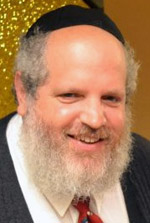By Rabbi Yeruchem Eilfort

CARLSBAD, California — A lot is happening this Shabbos! We have a double portion (described below), a special additional reading, called Parshat HaChodesh, in honor of the upcoming month of Nissan, which is the month that includes Passover. We conclude the Book of Exodus, which is when we proclaim, “Chazak! Chazak! Vi’nit’Chazaik!” (Stronger! Stronger! And we become stronger!) In other words, may we continue to grow in our Torah study!
It is also Shabbat Mevorchim – The Shabbat that we bless, so named because on the Shabbat before a new month (Rosh Chodesh), we add a special blessing for the upcoming month that it should be a month of redemption, of ingathering of the exiles, and that we should remember that we are all brethren. We ask that G-d should bless the upcoming month to be a month of life, and of peace, for gladness and for joy, for deliverance and for consolation.
There are so many things to think about and there is so little time. Let’s get cracking!
This week’s Torah portions are titled Vayak’hel (And He Gathered) and Pikudei (Accounts). The first portion details the construction of the Tabernacle (Mishkan). And the second portion concerns itself mostly with the accounting of the project; the specific amounts of the various materials used in the construction of the Mishkan.
Question: Why is it necessary for the Torah to repeat the details of the construction? We know that every letter in the Torah is there for a specific reason. When an entire section is repeated there must be a very good reason for it.
Answer: Our Sages discuss this issue and explain that whereas previously the Torah tells of G-d’s commandment to build the Tabernacle, in this portion the Torah tells us that the Jewish people successfully executed the order.
Imagine the implications. Humanity is commanded to build a physical edifice that would serve as the ‘dwelling place’ of the Divine Presence. Humanity has the ability (and obligation) to transform mundane physicality into something that houses/reveals the Infinite! In our portion we see that the Children of Israel were successful in this incredible endeavor. Yes! It can be done. Every additional detail in the successful completion of this divinely mandated mission is yet another ‘feather in the cap’ of humanity, yet another demonstration of our G-dly potential and abilities.
Another Question: Why was it important for the Torah to detail all of the various materials used to the last silver Shekel (coin)?
Another Answer: Here the Torah is teaching us best practices in running a communal project. It is critical that we have transparency, our Rabbis teach. Even Moses, the greatest of all prophets, gave an exact accounting lest anyone suspect him of being anything less than completely transparent.
And the Final Question: The names of the portions seem to indicate opposite ideas in that Vayak’hel means to gather – emphasizing communal responsibilities and dynamics, while Pikudei means to give an accounting, which of course means counting each thing individually. Which is the most important aspect as demanded by Torah, the collective or the individual?
And the Final Answer: Yes. Yes, I said ‘yes.’ The truth is that both aspects are critical to our success. We must be mindful of our individual responsibilities and our communal responsibilities. In America there is an ongoing debate about our individual rights versus our communal responsibilities. Who should be entitled to what? Well, in Judaism we have a very different outlook. We do not ask to what are we entitled? Instead we ask what are my responsibilities to the community, family, friends, and of course G-d? This portion helps understand the balance we must strike between the individual and the community.
And perhaps this is why we read this before the month that includes Passover. It is high time to prepare ourselves for our communal and individual redemption. It is our collective responsibility to make sure that not even one individual is left behind! Our ultimate strength is achieved when individually we make sure we are doing all in our power to insure the unity of all of us, together!
Shabbat Shalom!
*
Rabbi Yeruchem Eilfort is Director of Coastal Chabads and Chabad at La Costa. Rabbi Eilfort welcomes readers’ comments and questions and may be reached at RabbiE@ChabadatLaCosta.com.